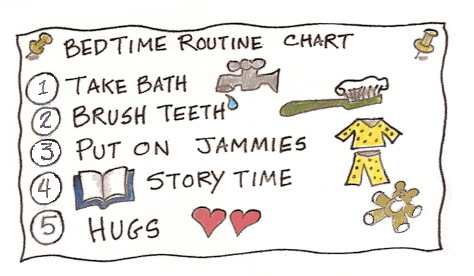Dealing with Bedtime Hassles
 Parents often raise concerns about bedtime routines. You know the drill – one more drink, one more story, one more trip to the bathroom and the list goes on.
Parents often raise concerns about bedtime routines. You know the drill – one more drink, one more story, one more trip to the bathroom and the list goes on.
There isn’t a child anywhere who doesn’t try to extend bedtime at least once in a while. But more serious bedtime problems may be a result of parents who allow themselves to get engaged in power struggles.
The more you involve children in the creation of routines, the more accountable they will be to them. In the September newsletter, I suggested that parents create routine charts with their children to help deal with the “morning rush”. That same system can work wonders with bedtime routines as well.
As with any routine chart, it’s important to involve the child in the entire process of creating the chart (and its best if each child has their own chart). Sit down with your child(ren) and brainstorm a list of all the things that need to be done before they go to bed — bath, pyjamas, teeth, lay out clothes for next day, story, hugs, etc. Then together, decide how much time is needed for each task. You can use limited choices here – for example “do you think you need 3 or 4 minutes to get into your pyjamas?” (Choices are another great way to give children positive power.)
Next, compile the list into its’ proper order. (Young children love having photos of themselves doing each task. Older children might like to draw pictures.) Next decide together where to hang the charts (on the child’s bedroom door or anywhere it is visible to the child).
Then when it is time to begin the routine, simply tell the child it’s time for bed instead of making demands. Ask, “What’s first/next on your bedtime routine chart?”, etc. (Most kids love telling you and feel empowered by this.) As with morning routine charts, the bedtime routine chart becomes the boss.
But what about kids who keep coming out of their rooms after they’ve been tucked in? This is the time for the Positive Discipline tool: Kindness and Firmness. Gently take the child’s hand (without words) and lead him/her back to his/her room. Don’t explain or talk about what is supposed to happen next – your child already knows that. Actions speak louder than words.
If a child has developed the habit of manipulation, it may take several nights of returning them to bed with kindness and firmness before they trust that you mean what you say. But stick with it – it will be well worth it in the end. Children will learn that their parents will treat them with respect but will not respond to manipulation efforts.
